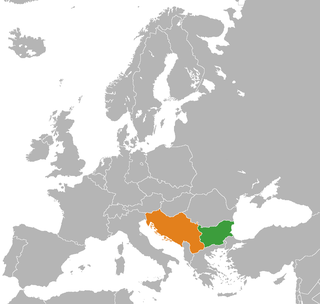
The Balkans, corresponding partially with the Balkan Peninsula, is a geographical area in southeastern Europe with various geographical and historical definitions. The region takes its name from the Balkan Mountains that stretch throughout the whole of Bulgaria. The Balkan Peninsula is bordered by the Adriatic Sea in the northwest, the Ionian Sea in the southwest, the Aegean Sea in the south, the Turkish straits in the east, and the Black Sea in the northeast. The northern border of the peninsula is variously defined. The highest point of the Balkans is Musala, 2,925 metres (9,596 ft), in the Rila mountain range, Bulgaria.

The Kingdom of Yugoslavia was a country in Southeast and Central Europe that existed from 1918 until 1941. From 1918 to 1929, it was officially called the Kingdom of Serbs, Croats, and Slovenes, but the term "Yugoslavia" was its colloquial name due to its origins. The official name of the state was changed to "Kingdom of Yugoslavia" by King Alexander I on 3 October 1929.

The term Greater Serbia or Great Serbia describes the Serbian nationalist and irredentist ideology of the creation of a Serb state which would incorporate all regions of traditional significance to Serbs, a South Slavic ethnic group, including regions outside modern-day Serbia that are partly populated by Serbs. The initial movement's main ideology (Pan-Serbism) was to unite all Serbs into one state, claiming, depending on the version, different areas of many surrounding countries, regardless of non-Serb populations present.

The Internal Macedonian Revolutionary Organization, was a secret revolutionary society founded in the Ottoman territories in Europe, that operated in the late 19th and early 20th centuries.

Dimitrovgrad alternatively Caribrod is a town and municipality located in the Pirot District of southeastern Serbia. According to 2022 census, the municipality has a population of 8,043 and the town has 5,188 inhabitants.

Vangeliya Pandeva Gushterova, commonly known as Baba Vanga, was a Bulgarian attributed mystic and healer who claimed to have foreseen the future. Blind since her early childhood, she spent most of her life in the Rupite area of the Belasica mountains in Bulgaria.

The Tsardom of Bulgaria, also known as the Third Bulgarian Tsardom, sometimes translated as the Kingdom of Bulgaria, or simply Bulgaria, was a constitutional monarchy in Southeastern Europe, which was established on 5 October 1908, when the Bulgarian state was raised from a principality to a tsardom.

Mladen Krstajić is a Serbian professional football manager and former player who played as a centre-back.

Ljubomir "Ljupko" Petrović is a Serbian professional football manager and former player. He also holds a Bosnian passport.
Greeks in Serbia number 690 people according to the 2022 census, and they are recognized as a national minority by the Serbian government. Many of them are not in enumerated the census because it was difficult for the administration to reach them. An estimation by the Association of Greeks in Serbia has the number of Serbs of Greek descent at 4,500 people. They are mostly concentrated in four Serbian cities: Belgrade, Smederevo, Niš and Novi Sad. Greek presence is also recorded in Sombor, Pančevo, Subotica, Kragujevac, Požarevac, Bor, Bački Petrovac and Zrenjanin. Many Greeks added the Slavic ending "ić", "ski" or "ev" to their surnames as an assimilation process in SFR Yugoslavia. The first association of Greeks in Serbia was formed in 1923 under the name "Riga od Fere". The first Serb-Greek friendship society was formed in 1934 by Pavle Karađorđević, and now has over 2,500 members in Serbia.

Sportski klub Jugoslavija, commonly known as Jugoslavija, was a Serbian football club based in Belgrade. It was originally formed as SK Velika Srbija in 1913 and changed its name to SK Jugoslavija in 1919. They were among the most popular Serbian and Yugoslav clubs, and they were nicknamed as "Crveni" because of their red shirts, in opposition to their greatest rivals BSK, who wore blue and were known as "Plavi". Until 1941 the sports society Jugoslavija, beside football, also included sections for athletics, cycling, winter sports, basketball, boxing, wrestling, swimming, and table tennis.

North Macedonia, officially the Republic of North Macedonia, is a landlocked country in Southeast Europe. It shares land borders with Greece to the south, Albania to the west, Bulgaria to the east, Kosovo to the northwest and Serbia to the north. It constitutes approximately the northern third of the larger geographical region of Macedonia. Skopje, the capital and largest city, is home to a quarter of the country's population of 1.83 million. The majority of the residents are ethnic Macedonians, a South Slavic people. Albanians form a significant minority at around 25%, followed by Turks, Roma, Serbs, Bosniaks, Aromanians and a few other minorities.
Dragan Šarac is a Serbian football manager and former player.

Drimia is a genus of African, south European and south Asian flowering plants. In the APG IV classification system, it is placed in the family Asparagaceae, subfamily Scilloideae. When broadly circumscribed, the genus includes a number of other genera previously treated separately, including Litanthus, Rhodocodon, Schizobasis and Urginea.
Acheroniotes is a genus in the beetle family Carabidae. There are at least three described species in Acheroniotes.
Neotrechus is a genus in the beetle family Carabidae. There are more than 20 described species in Neotrechus.

The JŽ class 412/416 is an electric multiple unit built for Yugoslav Railways (JŽ). The units are currently used by Serbian Railways (ŽS), Macedonian Railways (MŽ) and Montenegro Railways (ŽCG).

Yugoslav Canadians are Canadians of full or partial Yugoslav ancestry. At the 2016 Census, the total number of Canadians whose origins lie in former Yugoslavia, majority of whom indicated specific ethnic origin, was 386,340 or 1.12% of the total population.

Bulgaria–Yugoslavia relations were historical foreign relations between Bulgaria and now broken up Yugoslavia. Despite some substantial unification proposals in the aftermath of the World War II, Bulgarians were the only South Slavic nation which did not join the Yugoslav federation.

Anthrenus polonicus is a species of carpet beetle in the subgenus Helocerus of the genus Anthrenus, family Dermestidae. It is known from Belarus, Bulgaria, Czech Republic, Slovakia, "Yugoslavia", United Kingdom, Estonia, Germany, Hungary, Latvia, Russia, and Ukraine.















